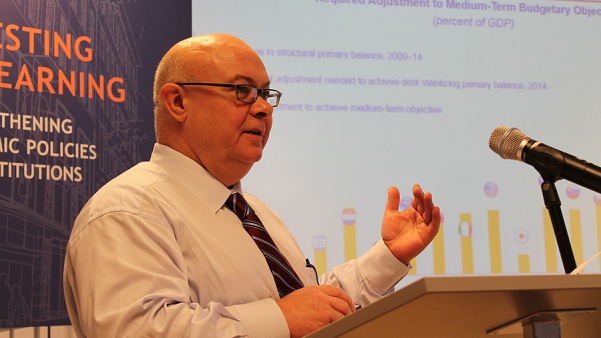
An International Monetary Fund (IMF) staff team led by Mr. Julio Escolano visited Addis Ababa from September 13 to 26, 2017 to conduct the 2017 Article IV consultation discussions with Ethiopia.
ADDIS ABABA (NBE)–Ethiopia’s economy has shown a strong resilience in 2016/17 despite weak global prices for its export items, said the International Monetary Fund (IMF).
The IMF staff team said, “The Ethiopian economy showed strong resilience in 2016/17 amid continued weak global prices for Ethiopia’s key exports and re-emergence of drought conditions in parts of the country”. Ethiopia’s Real Gross Domestic product is estimated to have expanded by 9 percent in 2016/17, according to IMF.
The remark was made by IMF staff team, led by Mr. Julio Escolano, following the visit to Ethiopia from 13 to 26 September 2017 to conduct the ‘2017 Article IV consultation’ discussions with Ethiopia.
Through “Article IV Consultations,” the IMF attempts to assess each member country’s economic health and to forestall future financial problems.
The staff team, in its press release said, “The Ethiopian economy showed strong resilience in 2016/17 amid continued weak global prices for Ethiopia’s key exports and re-emergence of drought conditions in parts of the country”.
Government interventions to mitigate the social impact of the drought, in collaboration with development partners, were timely and effective, thus limiting its human cost, they noted. They said, “Prudent budget execution led to a lower-than-planned fiscal deficit, estimated at 2.5 percent of GDP.”
Actions taken by authorities to contain external imbalances have led to ‘a narrowing of the current account deficit, and restrained debt accumulation, the team added. Nevertheless, exports continued to stagnate due to weak global commodity markets and delays in completion of key related projects.
“Medium-term growth prospects are favorable, supported by strong private investment, completion of key supporting infrastructure projects, and rising productivity as export-oriented industries take root” the IMF team said.
In the short term, however, the current account deficit remains high, and indebtedness and associated risks have increased. In this regard, they said, “until past investments in infrastructure and logistics pay off and exports take off, macroeconomic and financial policies should aim at reducing external imbalances and liabilities.”
Noting that social needs remain large, the staff team supports Ethiopia’s intention to protect pro- poor spending programs. They also urged the need to step-up ongoing efforts to strengthen domestic revenue collection and governance of public enterprises to mobilize domestic resources and encourage their effective use.
The Executive Board of the IMF is expected to discuss the staff report for Ethiopia in November 2017.
Source: National Bank of Ethiopia
——
Other stories:
- Ethiopia Opens $3.61 Billion Gap on Kenya’s Economy
- Inspired by China’s Success Story, Ethiopia Modernizes Its Economy
- Ethiopia: Manufacturing Industries vs. Climate Resilient Green Economy (CRGE)
- World Bank’s Global Outlook Considers Ethiopia as the World’s Second Fastest-growing Economy
- Ethiopia: Implementing Financial Inclusion Strategy to Transform from Cash Economy to Digital Transaction
